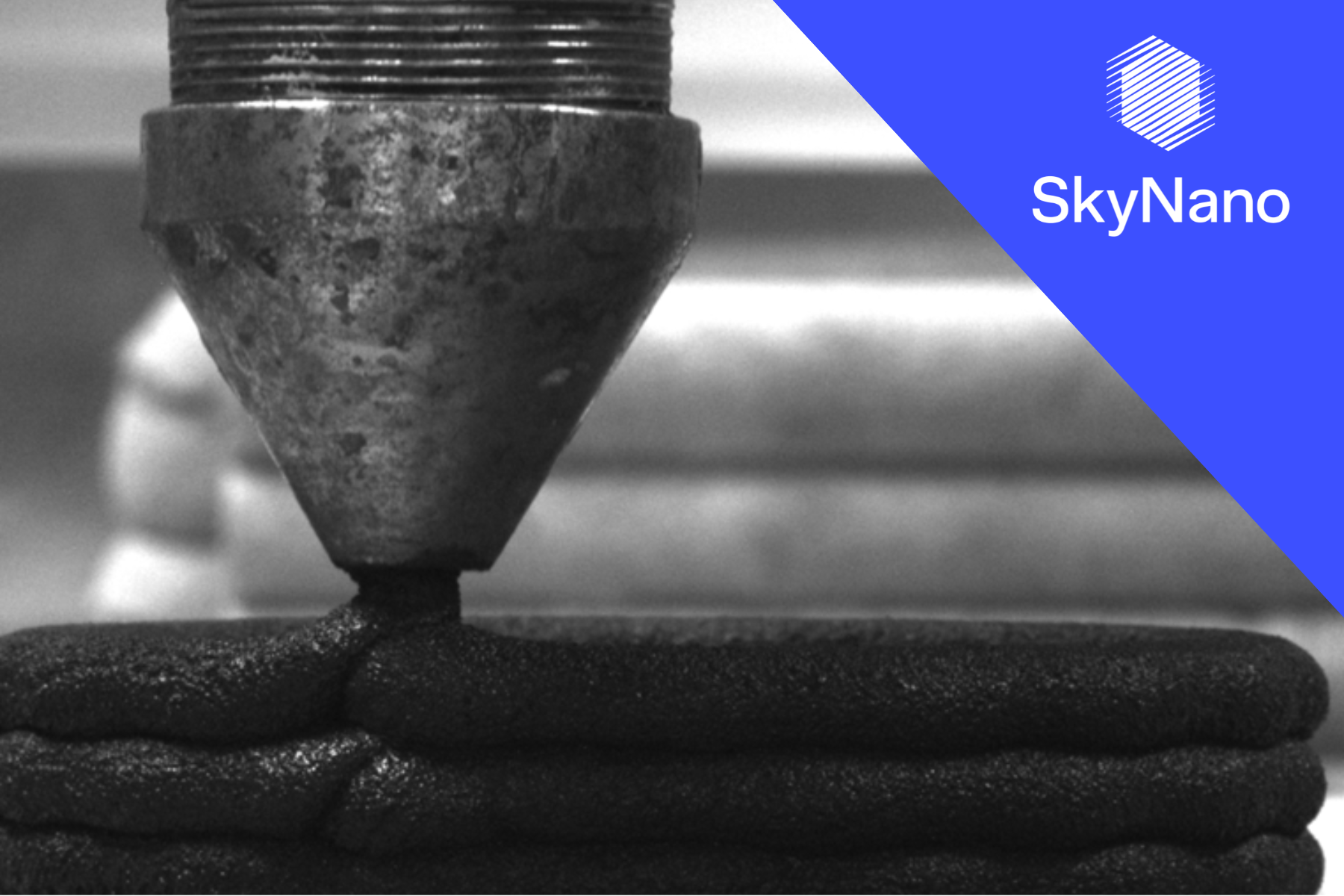KNOXVILLE, Tenn. – SkyNano is excited to announce that it has been awarded a $1 million Phase II Small Business Technology Transfer (STTR) grant from the Office of Naval Research (ONR). This 24-month project supports SkyNano’s partnership with the University of Tennessee’s Civil Engineering Department, led by Prof. Hongyu Zhou, to develop optimized carbon nanotube (CNT) cementitious composite materials for 3D printed concrete structures.
This research builds on the success of SkyNano’s Phase I STTR project, where the team demonstrated the 3D printability of CO2-derived CNT cementitious composites. Additionally, it showcased how CNTs can function as sensors for defect detection using Electrical Impedance Tomography (EIT). The goal of Phase II is to further optimize the material properties and functionalities of CNT-embedded concrete. This revolutionary material will enhance concrete’s structural integrity, while introducing smart sensing capabilities for infrastructure monitoring.
“We are thrilled to continue our collaboration with Prof. Zhou and the University of Tennessee to advance CNT utilization in cementitious composites for 3D-printed concrete,” said Anna Douglas, CEO of SkyNano. “Our successful Phase I efforts proved the feasibility of using CNTs as sensors in concrete structures. We’re eager to scale this technology and its real-world applications which address the Navy’s need for durable, multi-functional construction materials.”
Optimizing CO2-Derived CNTs for Advanced Concrete Applications
Phase II of the project focuses on scaling SkyNano’s proprietary CO2-to-CNT conversion process. With scaled outputs, this collaboration will continue fabricating CNT enriched cementitious composites that offer structural reinforcement and multi-functionality. In addition to strengthening concrete for 3D-printing applications, the project will explore the integration of EIT capabilities, enabling the detection of structural defects in real-time.
This innovative approach to material design will help address a significant issue in the construction sector—the aging infrastructure crisis. SkyNano’s CNT-based sensors allow real-time structural monitoring, cutting maintenance costs and improving safety in critical infrastructure. This solution applies to a wide range of high-impact applications including naval infrastructure, bridges, and other civil engineering projects.
Building on Phase I Success
During Phase I, SkyNano and the University of Tennessee successfully demonstrated:
• 3D printability of CNT-reinforced cementitious materials. This feat proved that we can integrate CO2-derived CNTs into concrete mix while maintaining material strength and print precision.
• Improved mechanical performance with the addition of SkyNano CNTs – 22% increase in compressive strength with a minor addition of CNTs into the concrete mix
• EIT proof-of-concept. Used as sensors, CNTs detected defects within a 3D printed concrete panel, offering a glimpse into the potential of this technology for self-monitoring infrastructure.
“The Phase I results were promising, showing that our CNT composites could serve not only as advanced construction materials but also as integral parts of a structural health monitoring system,” said Prof. Zhou. “Phase II will allow us to refine the material properties and optimize the EIT sensing capability for real-world applications.”
Addressing a Major CO2 Contributor: Cement Production
The cement industry is responsible for 8% of global CO2 emissions, making it one of the largest industrial contributors to greenhouse gas emissions. Phase II tackles both the climate impact of traditional concrete production and the need for more durable, sustainable building materials with multi-functionality like structural health monitoring and defect detection. SkyNano’s patented CO2 to CNT conversion process aids in developing clean, cementitious composites. This research aligns with growing efforts to decarbonize the construction industry and highlights the role that innovative materials can play in reducing emissions while enhancing performance.
For more information on SkyNano’s CO2 capture technology and its applications in sustainable materials, visit https://skynano.co/.
Media Contact
Name: Sharon Dwyer
Phone: 843.271.1595
Email: info@skynano.com
Website: https://skynano.co
LinkedIn: https://www.linkedin.com/company/skynano/
About SkyNano
SkyNano is a science-based technology company focused on commercializing a free-market solution to carbon pollution. It specifically develops a novel electrochemical manufacturing technology for the capture and conversion of CO2 from various sources (atmospheric, concentrated, flue gas) into valuable carbon-based materials including SkyNano’s flagship product – carbon nanotubes. Peer-reviewed scientific papers feature SkyNano’s technology, which also earned a 2020 R&D 100 Award and a 2021 TechConnect Innovation Award. Furthermore, our CEO and Co-Founder Dr. Anna Douglas was recognized with a Forbes 30 Under 30 award in 2019. In fact, both SkyNano founders are Forbes 30 Under 30 innovators, as Prof. Cary Pint was awarded the recognition in the inaugural year of the awards. To learn, visit: https://www.skynano.co
About the University of Tennessee’s Civil Engineering Department
The Civil Engineering Department at the University of Tennessee is a leader in infrastructure research, with a focus on developing innovative materials and technologies for sustainable construction. Prof. Hongyu Zhou’s research centers on the use of advanced materials in 3D printing and infrastructure monitoring.
About the Office of Naval Research (ONR)
The Office of Naval Research (ONR) supports scientific research and technology development that improves the capabilities of the U.S. Navy and Marine Corps. Through the STTR program, the ONR fosters partnerships between small businesses and research institutions to advance innovative solutions to military challenges.



